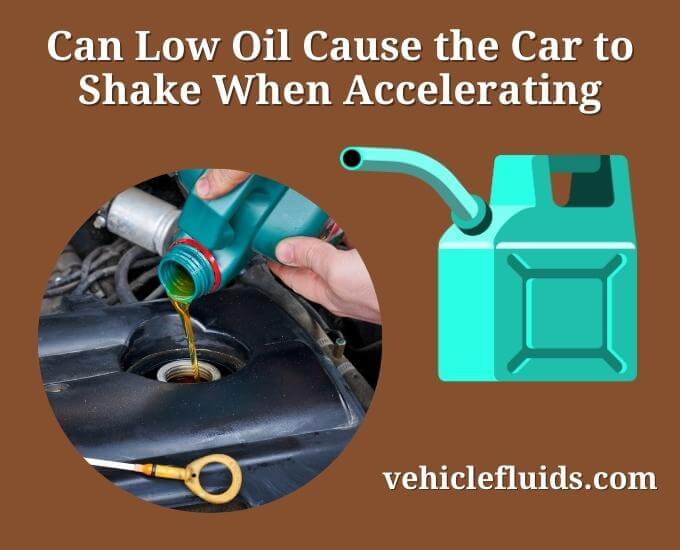Are you experiencing a shaking sensation when accelerating your car? If so, you may be wondering what the cause could be. Low oil levels can be the culprit behind this shaking.
When the oil level is low, the engine components start to come in direct contact with each other, causing excessive wear and tear, as well as an increase in heat and friction. This can result in a shaking or vibrating sensation, especially when the car is accelerating.

Additionally, low oil levels can cause the engine to overheat, leading to further damage and reduced performance. Therefore, it is important to regularly check the oil levels and ensure that the engine is well-lubricated to prevent these issues from occurring.
The Mechanism of Car Engine Oil
The main function of engine oil in a car is to lubricate the moving parts, reducing friction and wear. It also helps to clean the engine, keep it cool, and prevent corrosion. Engine oil circulates through the engine, picking up contaminants and carrying them to the oil filter where they are removed.
The oil also acts as a sealant, helping to keep combustion gases from entering the crankcase. Over time, the oil can become contaminated or degraded, reducing its effectiveness, so it is important to change the oil at regular intervals to maintain the health of the engine.
Symptoms of Low Engine Oil in Cars
Some common symptoms of low engine oil in a car include:
- Warning light: The oil pressure warning light will illuminate the dashboard if the oil level is too low.
- Engine noise: The engine may make knocking or ticking noises, indicating a lack of oil lubrication.
- Engine performance: A decrease in engine performance, such as a loss of power or acceleration, may occur as a result of low oil levels.
- Smoke from engine: Blue or gray smoke coming from the engine may indicate oil is burning due to low levels.
- Oil leaks: Low oil levels may be caused by oil leaks, which should be fixed as soon as possible.
- Engine damage: Continued operation of a vehicle with low oil levels can cause serious and expensive damage to the engine.
It is important to regularly check the oil level and top up as needed to prevent these symptoms and maintain the health of the engine.
How to Check the Oil Level in Your Car?
To check the oil level in a car, follow these steps:
- Park the car on level ground and wait a few minutes to let the oil settle.
- Locate the oil dipstick, which is usually a yellow-colored loop near the engine.
- Remove the dipstick and wipe it clean with a rag or paper towel.
- Re-insert the dipstick fully, then remove it again to check the oil level.
- The oil level should be between the two marks on the dipstick, indicating that it is at the correct level. If the oil level is low, add oil as necessary through the engine oil fill cap, usually found near the dipstick.
Always use the recommended type of oil for your car and do not overfill as this can cause damage to the engine.
Importance of Fixing Low Engine Oil Problem
Engine oil is a vital component of your vehicle and its importance cannot be overemphasized. Engine oil helps to lubricate the internal components of the engine and also helps to absorb heat, maintain engine temperature, and prevent corrosion. Low engine oil levels can lead to:
Engine Overheating
Engine oil helps to absorb heat generated by the engine. If the oil level is low, the engine will overheat, causing damage to the internal components, including the cylinder walls, bearings, and pistons.
Engine Wear
Engine oil acts as a lubricant, reducing friction and wear between internal engine components. If the engine oil level is low, friction and wear will increase, leading to accelerated engine wear and possible engine failure.
Engine Noise
Engine oil helps to dampen noise generated by internal engine components. If the engine oil level is low, the noise will increase, indicating possible damage to the engine.
Engine Sludge
Engine oil helps to prevent the formation of engine sludge, which is a thick, sticky substance that can clog engine passages and cause damage. If the engine oil level is low, sludge will form, leading to decreased engine performance and possible engine damage.
How Low Oil Affects a Car’s Performance?
Low oil levels in a car can cause some serious performance issues, making noise and one of the most noticeable is a shaking sensation when accelerating. This is due to the fact that oil is a crucial component in the engine’s functioning, as it helps keep all the moving parts lubricated.

Low oil levels in a car can have a negative impact on the car’s performance and engine life. The oil in a car is responsible for lubricating engine components, removing heat and debris, and maintaining the engine’s overall health.
If the oil level is low, it can cause increased friction between engine components, leading to excessive heat, engine wear and tear, and even damage to the engine. In severe cases, low oil levels can cause the engine to seize and completely fail.
To maintain a car’s performance and engine life, it’s important to regularly check the oil level and make sure it stays within the recommended range.
How Low Oil Can Cause a Car to Shake When Accelerating?
Low oil levels can cause a car to shake when accelerating due to several reasons. They are given below:
| First | Oil helps lubricate the engine, so if the oil level is low, the engine’s moving parts may start to rub against each other, causing a shake or vibration. |
| Second | Oil also helps dissipate heat, so if the oil level is low, the engine may overheat, causing it to shake. |
| Third | Low oil levels can also cause low oil pressure, which can lead to poor engine performance and vibration. To avoid these issues, it is important to regularly check the oil level and refill it as needed. |
How to Prevent Low Oil Levels in Your Car?
If your car is shaking or vibrating when you accelerate, the first thing you should check is the oil levels. Low oil levels can cause a car to shake when accelerating, due to the lack of lubrication between its moving components.
To prevent low oil levels in your car, you can follow these steps:
Check the Oil Level Regularly
Get in the habit of checking the oil level once a month or before long trips.
Maintain the Right Oil Level
Fill the oil up to the recommended level as specified in your car’s owner’s manual.
Use the Recommended Oil Type
Make sure to use the correct type of oil as specified by your car’s manufacturer.
Change Oil Regularly
Regular oil changes are important to maintain the oil’s lubricating properties and prevent contamination.
Monitor for Leaks
Inspect the engine area for oil leaks and have them fixed promptly to prevent excessive oil loss.
Avoid Overloading
Don’t overload your car and maintain a safe driving speed to reduce engine stress and oil consumption.
Replenishing the Oil
To ensure that your car is running at its best, it is important to make sure that the oil levels are replenished regularly. Not only will this help improve your car’s performance, but it will also help to extend the life of your car and its engine.
Diagnosing Other Potential Causes of the Problem
If the oil level is too low, the oil won’t be able to properly lubricate the engine, resulting in an inability to evenly distribute the heat across the engine and causing it to vibrate. Additionally, low oil levels can cause the engine to overheat, which can cause the car to shake when accelerating.
Getting Professional Advice or Assistance
It is important to check the oil levels regularly to ensure that they are within the manufacturer’s recommended levels. If the oil levels are low, it is best to have the engine checked by a professional and have the oil changed if necessary.
In a Nutshell
Low oil levels in a car can cause the engine to shake when accelerating. This is because oil is crucial in lubricating the engine’s moving parts, allowing them to function smoothly. If there is not enough oil, these parts will start to grind against each other, resulting in a shaking sensation and potentially causing damage to the engine.
To avoid this problem, it is recommended to regularly check the oil levels in your car and have the oil changed at the recommended intervals. Doing so can help ensure that your engine runs smoothly and avoid costly repairs down the road.
